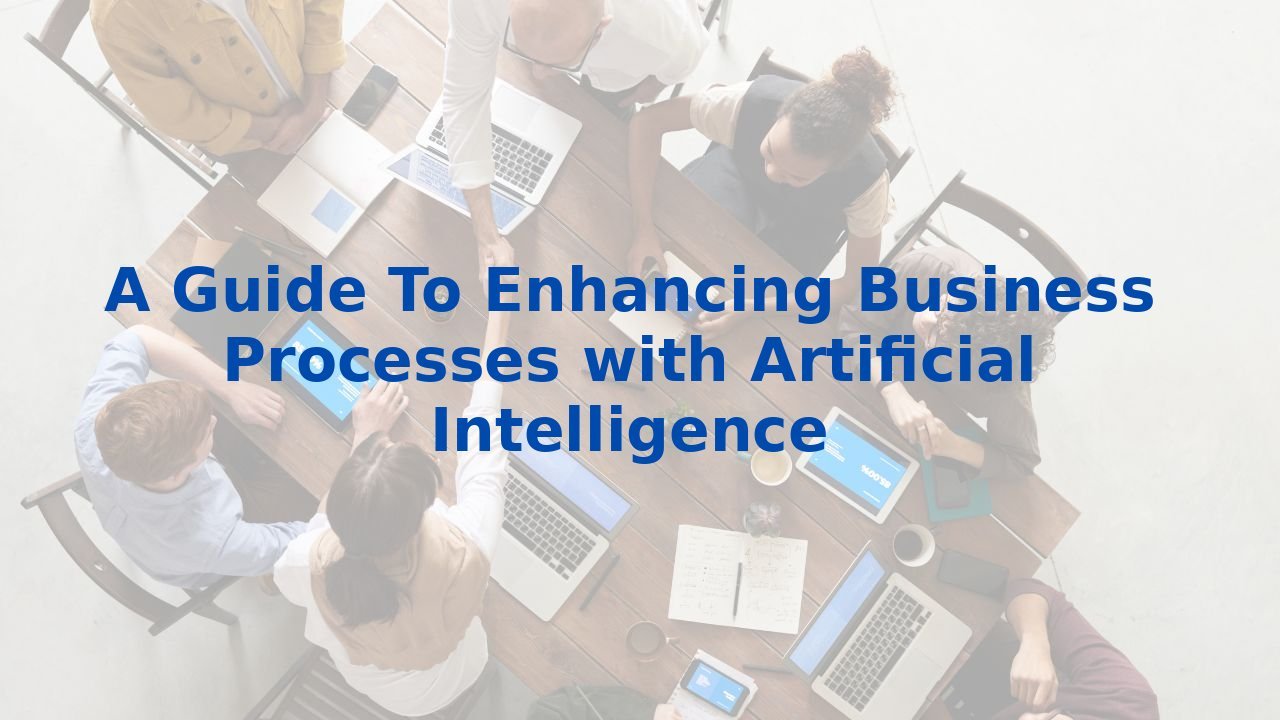A Guide To Enhancing Business Processes with Artificial Intelligence
A Guide To Enhancing Business Processes with Artificial Intelligence
In a world that evolves at lightning speed, businesses are on a relentless quest for efficiency and innovation. Enter Artificial Intelligence (AI)—a transformative force capable of reimagining the way we operate. By harnessing AI, organizations unlock the potential to automate repetitive tasks, refine workflows, and support data-driven decision-making. Let’s explore the various realms where AI can enhance business processes, fostering a culture of efficiency and creativity across the board.
1. Improving Meetings
Meetings, while essential, often become encumbered by tedious logistics. AI steps in here as a powerful ally. Imagine a voice assistant that schedules appointments and summarizes discussions in real time, liberating teams from the clutches of administrative burdens. With such technology, the focus shifts to innovation and collaboration, fostering an environment where ideas flourish rather than stagnate.
2. Enhancing Sales and Marketing
In the realm of sales and marketing, AI analytics can unearth invaluable insights within customer relationship management systems. By pinpointing high-revenue prospects and forecasting potential losses, businesses can strategically channel their efforts. Furthermore, chatbots elevate customer interactions by resolving common queries efficiently, reducing frustration and bolstering satisfaction. Here, AI doesn't just enhance performance—it revolutionizes how teams engage with clients.
3. Assessing and Improving Customer Service
Customer service can be a double-edged sword: while essential, it can also be complex. AI is capable of automating the assessment of service quality, pinpointing weaknesses in interactions with remarkable precision. By utilizing this technology, organizations can continually refine their service strategies—ensuring that every customer interaction contributes positively to the brand's reputation.
4. Improving Product Development Processes
AI-driven generative design software opens the door to endless possibilities. By quickly exploring multiple design options based on specifications, businesses save precious time and resources while sidestepping unnecessary prototypes. This approach not only streamlines product development but also fuels creativity, allowing human ingenuity to shine in ways previously unimagined.
5. Automating Content Generation
Content is king, but producing it consistently can stretch resources thin. AI's ability to generate engaging content—whether for product descriptions or industry articles—ensures a steady flow of creativity. By automating this process, businesses can maintain a robust content strategy without overwhelming human teams, effectively optimizing resource allocation.
6. Enhancing the Manufacturing Process
The integration of AI into manufacturing leads to the emergence of collaborative robots, or cobots, which work alongside human operators. This synergy enhances safety and efficiency, minimizing human error while maximizing precision and speed. By intertwining human oversight with AI capabilities, companies can achieve an unprecedented level of operational excellence.
7. Streamlining Workflows
Perhaps one of the most significant impacts of AI is its ability to streamline workflows. By automating repetitive tasks and fine-tuning processes, organizations can free up valuable employee time. This not only increases productivity but also enables teams to concentrate on high-level, strategic initiatives—maximizing overall output and effectiveness.
The Role of AI in Business Process Management
AI is much more than a tool; it’s a catalyst for change in business process management. Through ongoing feedback loops and data-driven insights, businesses can refine their operations at an unprecedented pace. Key areas to consider include:
Process Mining
Using AI algorithms to analyze event logs, organizations can gain deep insights into how processes are executed. This critical analysis uncovers bottlenecks and inefficiencies, setting the stage for informed decision-making.
Process Optimization
AI-driven insights allow for the identification of improvement areas. Strategies could range from automating routine tasks to completely reengineering processes for enhanced efficiency. Implementing these recommendations drives performance excellence across the board.
Benefits of AI in Business Process Management
The benefits of AI integration are profound:
- Streamlined Workflows: Automation cuts down on errors and enhances efficiency.
- Improved Efficiency: Employees can refocus their energies on strategic activities, maximizing productivity.
- Enhanced Decision-Making: AI's capability to analyze vast data volumes promotes proactive governance.
- Real-Time Monitoring: AI tools provide tracking of key performance indicators, allowing for swift corrective actions.
- Predictive Analytics: Assessing historical data empowers organizations to preemptively tackle potential disruptions.
The Importance of Training Employees for AI
While AI offers transformative potential, its success hinges on skilled personnel. Training employees to efficiently utilize AI tools enhances adaptability and leverage insights, ensuring strategic alignment. The fusion of human intuition with AI-driven insights results in decisions that are balanced and robust—propelling organizations toward long-term success.
In conclusion, AI represents a paradigm shift in enhancing business processes. By automating tasks, streamlining workflows, and refining decision-making, organizations set the stage for remarkable improvements in efficiency and productivity. Embracing AI isn't just about adopting new technology; it's about fostering a future where innovation thrives, and every team member contributes to the unfolding story of success.



